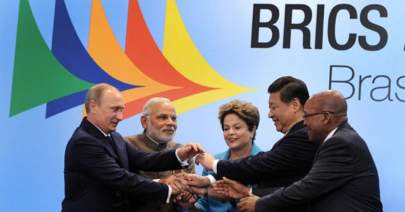Bigger BRICS
Thursday, January 25, 2024
Written by Laurence F Sanford, Senior Analyst ASCF
Categories: ASCF Articles

January 15th, 2024 - BRICS is an economic trading bloc that openly states a desire to replace the U.S. dollar as the world’s reserve currency. It was organized in 2010 by Brazil, Russia, India, China, and South Africa to reduce U.S. economic influence worldwide and to develop alternative payment methods to the U.S. dollar.
In August 2023, BRICS expanded its membership to include Iran, Saudi Arabia, the United Arab Emirates, and Ethiopia. Argentina was invited to join during the rule of Peronist Alberto Fernandez. After the December 2023 inauguration of President Javier Milei, Argentina declined to accept. Milei declared he wanted to align Argentina more with the U.S. than with China-led BRICS. During the election campaign, Milei described the Chinese government as “assassins.” He also called Pope Francis, a native of Argentina, an “imbecile” and the “devil’s man on earth.” Milei has since softened his words, invited 87-year-old Pope Francis to visit his homeland, and Milei now plans to visit the Vatican. Brazil and China are Argentina’s largest trading partners, followed by the United States.
The New Development Bank (NDB) was established by BRICS in 2015 to mobilize resources for development projects in emerging markets and developing countries. NDB is headquartered in Shanghai, China, and is led by President Dilma Rousseff of Brazil. She is Brazil's former president who was impeached in 2016 for corruption and forced to leave office. She previously served three years in jail for far-left subversion.
BRICS’ ultimate goal is to move international trade away from the U.S. dollar and utilize local currencies. Since China conducts seventy percent of the bloc's trade, increasingly trade is conducted with the Chinese yuan (Renminbi) and local currencies versus the U.S. dollar. China and Russia now trade in the local currencies of the yuan and the ruble. Seven other countries currently are or are considering conducting trade in the yuan and local currencies:
● Saudi Arabia
● Argentina
● Brazil
● Bangladesh
● Pakistan
● Iraq
● Thailand
The U.S. Treasury Department's sanctions imposed on Russia after the Ukraine invasion have accelerated the world’s diminishing use of the U.S. dollar for trade and investment. Freezing Russia’s holdings of the dollar may have temporarily hampered Russia’s war efforts, but the freezing also sent a signal to other countries with differing geopolitical views that the U.S. could do to them what it did to Russia.
The dollar is the world’s reserve currency due to agreements with Saudi Arabia that transactions will be in U.S. dollars, and in turn, the U.S. will provide protection. Saudi Arabia has now publicly stated it is willing to sell oil in currencies other than the U.S. dollar. President Biden calling Saudi Arabia a “pariah, that the ruling family has “very little socially redeeming value,” and ending U.S. support to Saudi Arabia for actions against Houthis in Yemen probably hasn’t helped relations.
If the dollar is no longer the world's reserve currency, it will greatly increase the cost of
borrowing on America’s $34 trillion debt. Foreign nations are decreasing their dollar value holdings and buying gold instead of U.S. debt. The U.S. government spent $659 billion in 2023 paying off interest on debt. In 2021, interest was $352 billion. Depending upon future rates, interest payments could reach $2 trillion a year, consuming 30% of federal tax revenue. Social security, Medicare, and defense spending will be severely curtailed. More debt will be incurred to pay the debt.
Summary
BRICS is not going away. If anything, it is becoming bigger and more influential. BRICS economies are now larger than the G7 developed economies of the U.S., Canada, the UK, Germany, France, Italy, and Japan.
If the United States wants to remain the world’s reserve currency, it should tend to its own garden by strengthening its military, economy, and culture.
Hemingway described bankruptcy as “gradually, then suddenly.” The U.S. federal budget is on a Titanic-esque voyage that could result in a fatal crash with a massive iceberg of unfunded entitlement obligations. Without changing course, the very foundations of a liberal democracy will be undermined. And BRICS, led by China, will pick up the debris of a bankrupt America.
Action
- Balance the budget. Inflation lowers the standard of living and demoralizes the citizens. Ballooning debt interest payments divert resources away from
productive endeavors. - Stop the massive subsidies to so-called “green energy” which tear down American industries and build up Chinese industries. Electric vehicle (EV), solar, and wind turbine technologies are dominated by our enemy, the Chinese Communist Party of China (CCP).
- Stop imposing sanctions. They do little good in the long term. Communists still control Cuba 60 years after sanctions were imposed. Russia, instead of selling gas and oil to Western Europe and the U.S.,now sells to China and India.
- Increase military capabilities by reforming leadership and instituting policies to add to the military-industrial complex.
Peace Through Strength!
Laurence F. Sanford
Senior Analyst
American Security Council Foundation




